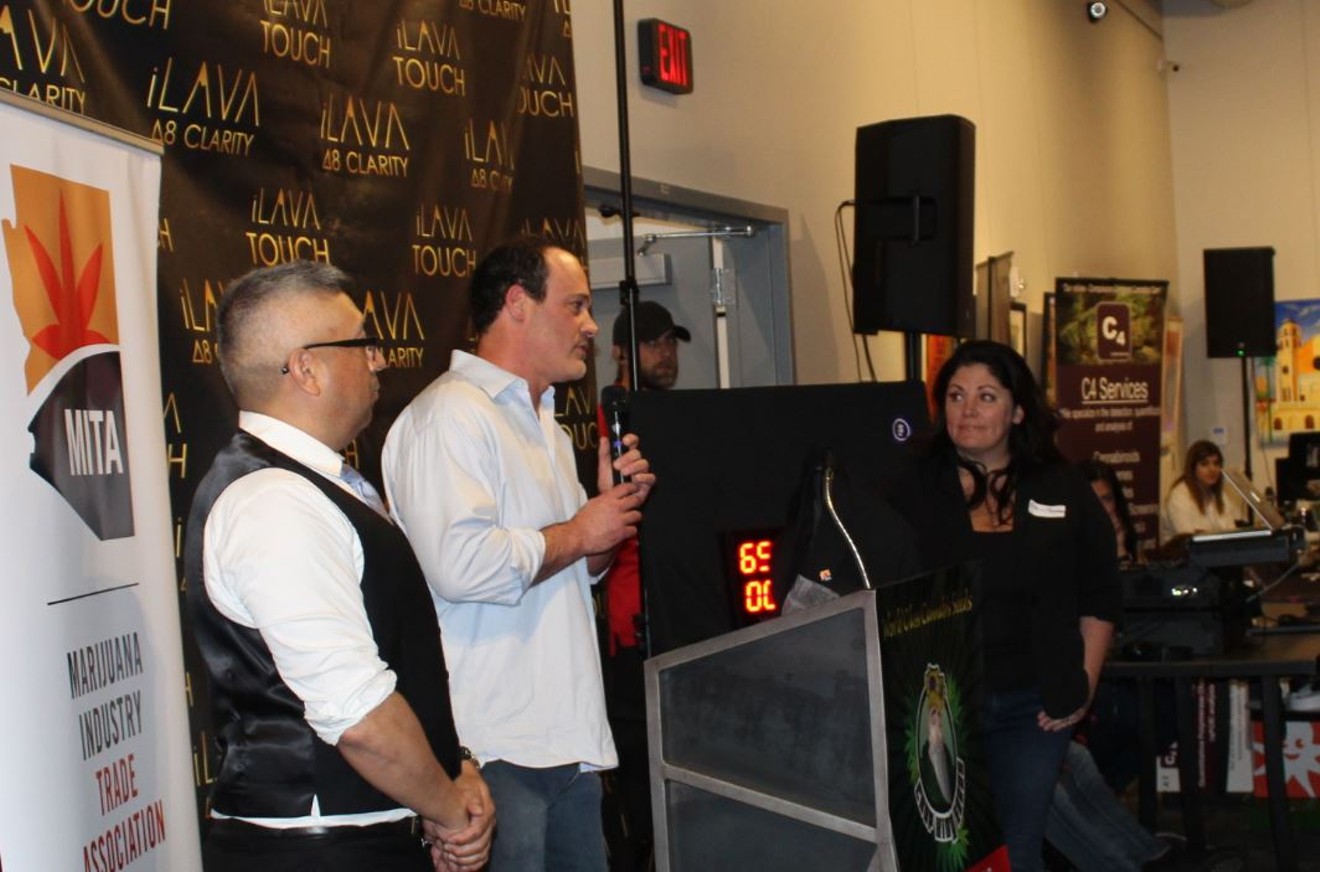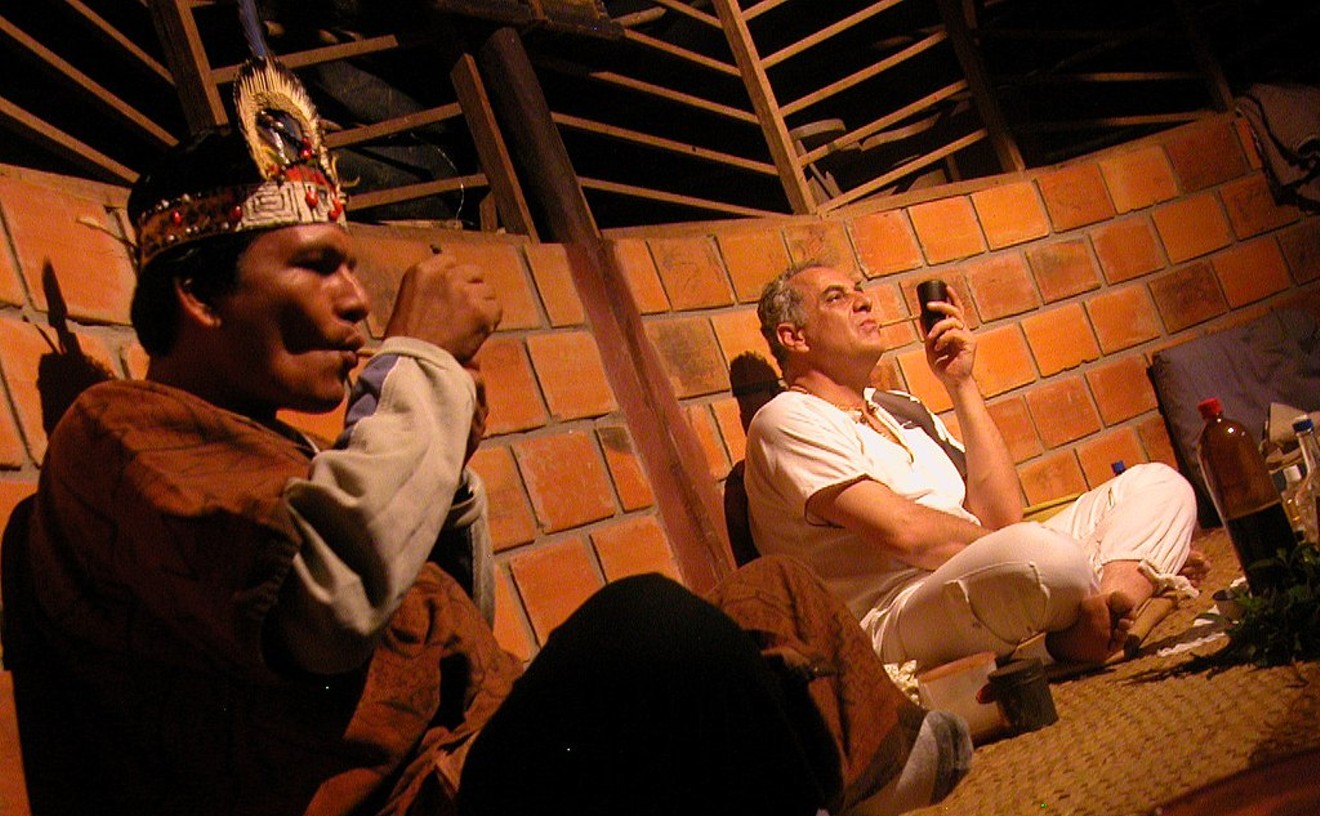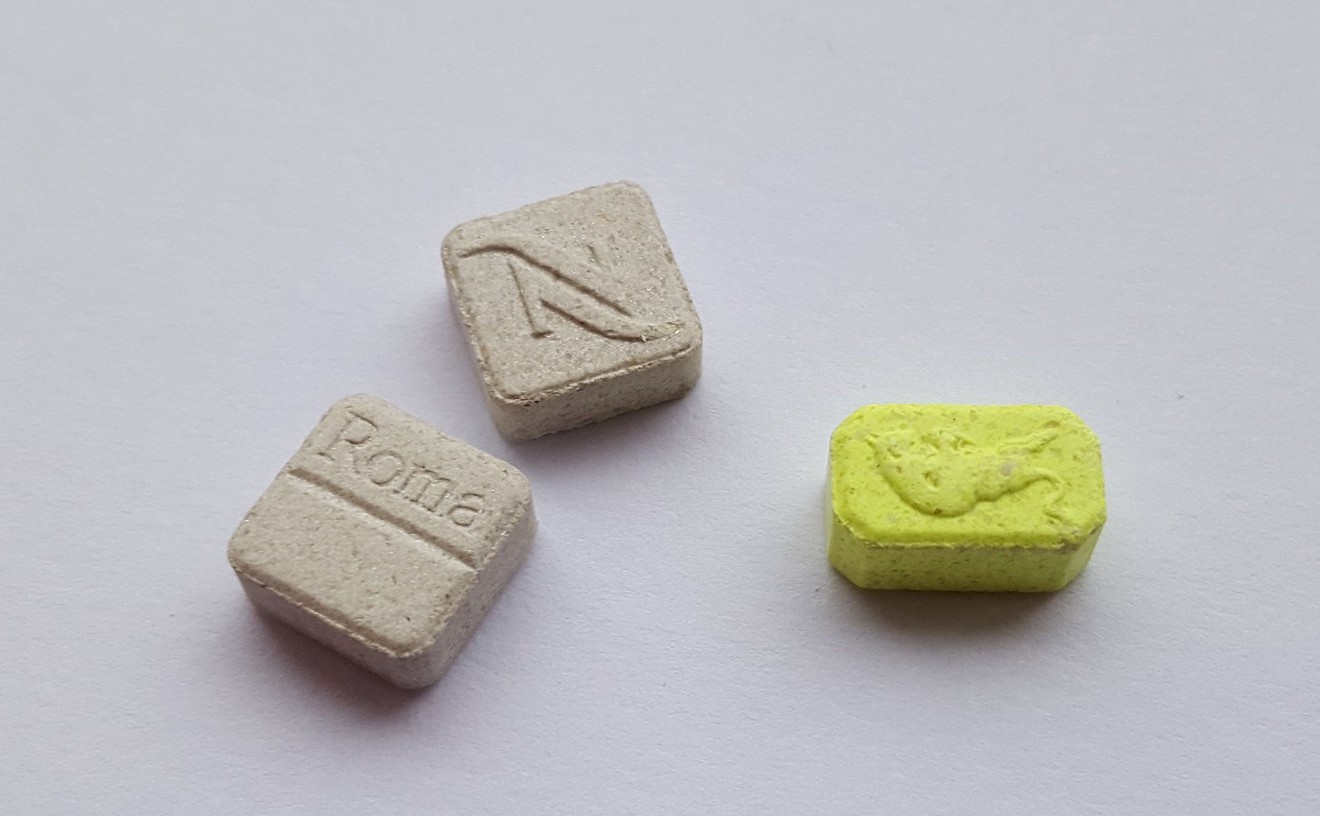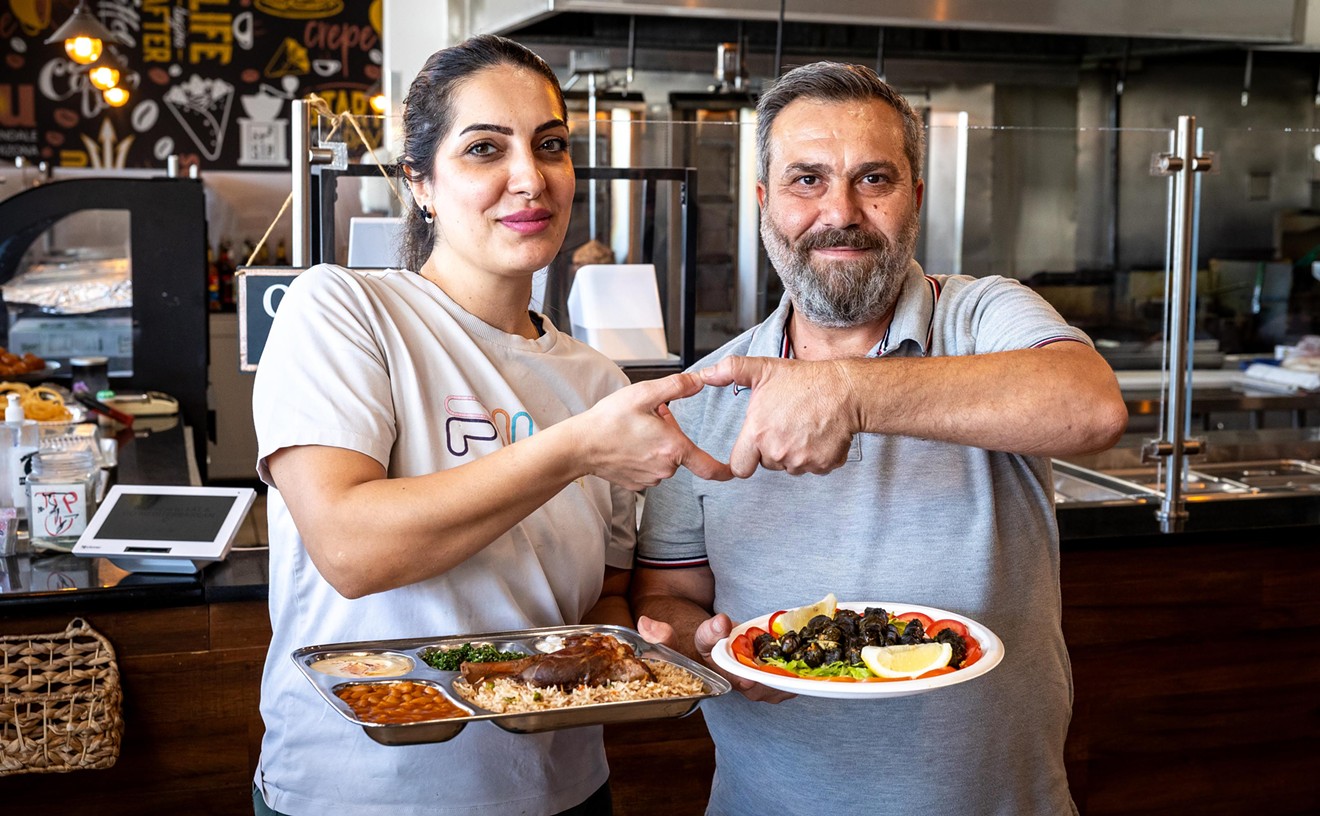Medical marijuana businesses will put a well-funded adult-use legalization measure on Arizona's ballot for 2020, industry leaders announced on Wednesday to a crowd of dispensary owners, patients, and observers.
The text and precise details of the planned citizen initiative remain a secret for now. But Steve White, president of the Arizona Dispensary Association and CEO of Harvest, made it clear that the campaign would be run more smartly than the failed Prop 205 of 2016. That initiative lost 51.3 percent to 48.7 percent.
In packed room at the Found:RE Hotel in Phoenix, more than 200 people attending a Marijuana Industry Trade Association (MITA) meeting listened with anticipation as White took the mic and explained how the new effort will be based on ideas that poll well. He introduced Stacy Pearson, senior vice president of Strategies 360, the multistate PR company that will run the campaign. The Marijuana Policy Project tapped the same company to run its successful 2014 recreational marijuana initiative in Alaska.
About "70 percent" of the Arizona measure has been drafted, White said, but its backers were still conducting polling and talking to people about what should be, or perhaps should not be, in the initiative. He gave a few hints about what the public could expect of the plan.
The priority would be a type of legalization that "impacts most people's lives, the people most adversely affected by cannabis laws," he said.
Of course, that kind of legalization would also expand greatly the potential market for dispensary businesses in Arizona, which is why cannabis business operators would pour millions of dollars into a campaign effort.
Leaders will try to find the "sweet spot" for the initiative's text, White said.
For instance, testing cannabis products for contaminants and to make sure they contain what they advertise "happens to be the right thing to do and it polls well," he said.
Home cultivation might be part of the initiative, too. But White suggested that some ideas that are popular among the pro-cannabis set could be left on the cutting-room floor in the interest of appealing to the most voters.
"The last bill ... tried to solve the world's problems," he told the crowd. "This time around, we will let the campaign people do campaign things — we'll fund it and step aside."
Demitri Downing, MITA's executive director, continued that theme, prepping cannabis activists for the possibility that some of their pet causes may not make it in.
"It's about striking a balance, and you're never going to get everything you want," Downing said.
Pearson noted that her group's work in Alaska resulted in the only "red" state where voters have approved adult-use legalization. Strategies 360 also ran the successful drive to oust six-term Republican Maricopa County Sheriff Joe Arpaio in the 2016 election, replacing him with Democrat Paul Penzone.
The group has a "lot of work to do" before revealing the terms of the initiative, she said, including talking with community members and stakeholders, and conducting more research and polling.
White and Pearson then answered several questions from audience members about the possible details, but gave no definitive responses. A question about the possible expungement of previous marijuana convictions was also left open.
The Arizona Dispensary Association plan drew mostly positive reactions from some crowd members.
"Excellent. Exciting," said Cindy Abbott of MPX Bioceutical Corporation of the initiative effort.
A few people expressed frustration at the lack of details so far of the industry-led initiative, none more than cannabis activist Stacey Theis, who lambasted the speakers at the meeting for what she considered a lack of transparency.
"What a disappointment!!" Theis wrote in a Facebook post on Thursday morning. "They advertised they would be sharing details of their 2020 legalization initiative!! Paid 60 bucks for us to get in and the only details we got.....about 70% of the language is drafted but the leader dont know what is currently in that 70% because they are still polling! WTF??? They know there will be testing and they are "leaning towards some kind of cultivation rights" !! I gave them 60 bucks to learn squat and I guess help pay for their so far shitty efforts and twisted agendas !!"
Theis supports the "Arizona Cannabis Justice Act," which was filed as initiative I-08-2020 with the Secretary of State's office in January. It would remove the criminal codes for most personal cannabis offenses for everyone 18 or older, expunge the records of people busted in the past for possession, and "decriminalizes all cannabis offenses," among other things.
"I do believe there's a good chance for it to get on the ballot," Theis said on Thursday, adding that the group has already begun to collect signatures. "The people that are about freedom, that have money, they're there, and they want to support people to get out on the ground."
However, that initiative, like other failed measures before it, likely won't have the big-money funding to hire the petition-gatherers needed to make the ballot. A 2020 initiative would require 356,467 valid voter signatures for an initiative run as a potential constitutional amendment, and 237,645 signatures for a regular initiative. Dispensaries funded most of the roughly $5 million spent on the pro-Prop 205 campaign in 2016.
One of the many, and still-debated, reasons for the failure of Prop 205 was the opposition to its terms by some grassroots cannabis activist groups, including Safer Arizona and Arizonans for Mindful Regulation. It's unclear how cannabis-rights activists or the anti-marijuana Arizonans for Responsible Drug Policy, led by Sheila Polk, may react to a new initiative by the dispensary industry. Avoiding the topic of what may be in the measure will prevent it from being a target in the short term, but opposition of some sort is probably a good bet once the details come out.
The MITA meeting also featured talks by Robert Mandel, the lead lawyer for the defense in the case of State v. Rodney Christopher Jones, who argued the case at an Arizona Supreme Court hearing in Phoenix this week, and by political consultant Brett Mecum, who's helping on a bill in the Arizona Legislature this year that would provide testing of medical marijuana products.
Arizona has some of the toughest anti-marijuana laws in the country, with any testable amount a chargeable felony. About 190,000 people now have medical marijuana cards that allow them to legally possess and use cannabis products for medicinal purposes, but prohibitionists like Yavapai County Attorney Sheila Polk and Maricopa County Attorney Bill Montgomery continue to push the idea that anyone caught with marijuana should be arrested and put through a legal wringer. An estimated 29,000 Arizonans have been arrested for marijuana possession since Prop 205's failure.
[
{
"name": "Air - MediumRectangle - Inline Content - Mobile Display Size",
"component": "18478561",
"insertPoint": "2",
"requiredCountToDisplay": "2",
"watchElement": ".fdn-content-body",
"astAdList": [
{
"adType": "rectangle",
"displayTargets": "mobile"
}
]
},{
"name": "Editor Picks",
"component": "16759093",
"insertPoint": "4",
"requiredCountToDisplay": "1",
"watchElement": ".fdn-content-body",
"astAdList": [
{
"adType": "rectangle",
"displayTargets": "desktop|tablet"
},{
"adType": "rectangle",
"displayTargets": "desktop|tablet|mobile"
}
]
},{
"name": "Inline Links",
"component": "17980324",
"insertPoint": "8th",
"startingPoint": 8,
"requiredCountToDisplay": "7",
"maxInsertions": 25
},{
"name": "Air - MediumRectangle - Combo - Inline Content",
"component": "16759092",
"insertPoint": "8th",
"startingPoint": 8,
"requiredCountToDisplay": "7",
"maxInsertions": 25,
"watchElement": ".fdn-content-body",
"astAdList": [
{
"adType": "rectangle",
"displayTargets": "desktop|tablet"
},{
"adType": "rectangle",
"displayTargets": "desktop|tablet|mobile"
}
]
},{
"name": "Inline Links",
"component": "17980324",
"insertPoint": "8th",
"startingPoint": 12,
"requiredCountToDisplay": "11",
"maxInsertions": 24
},{
"name": "Air - Leaderboard Tower - Combo - Inline Content",
"component": "16759094",
"insertPoint": "8th",
"startingPoint": 12,
"requiredCountToDisplay": "11",
"maxInsertions": 24,
"watchElement": ".fdn-content-body",
"astAdList": [
{
"adType": "leaderboardInlineContent",
"displayTargets": "desktop|tablet"
},{
"adType": "tower",
"displayTargets": "mobile"
}
]
}
]













